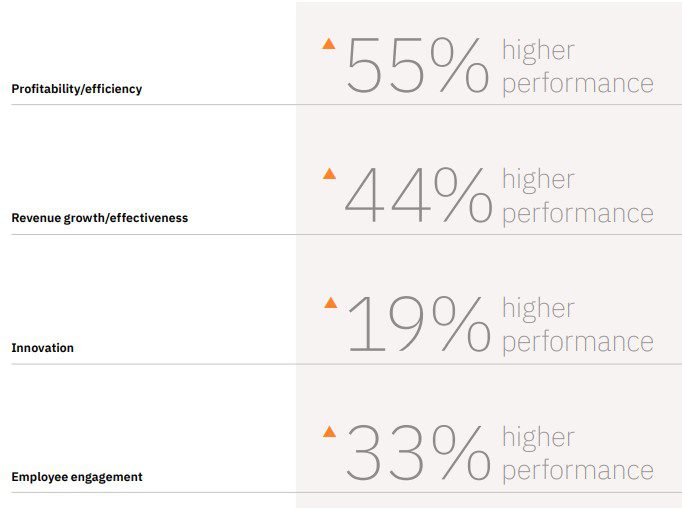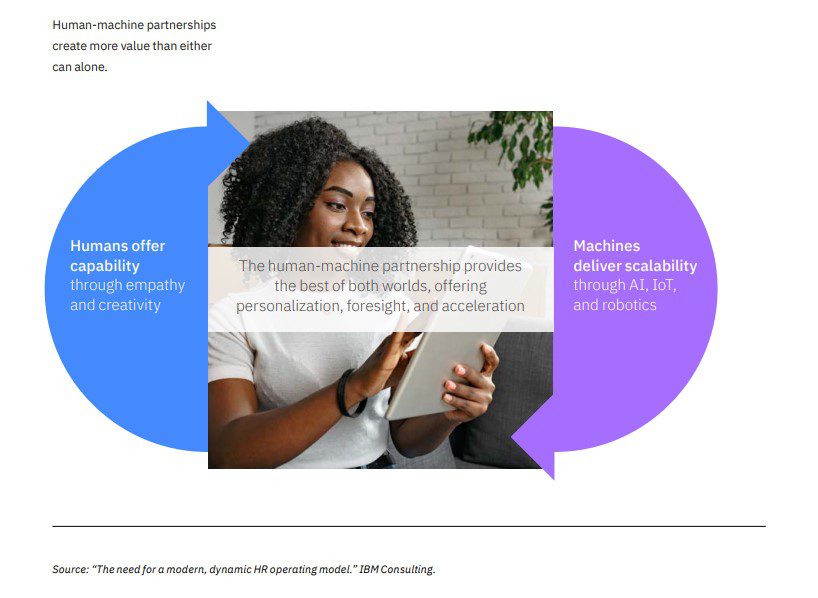IBM: AI-ready employers achieve 44% higher revenue
That’s according to a global survey of 3,000 executives and 21,000 employees.
News In Brief
AI is a challenge for organizations globally.
But companies who really sit down and rethink their operations will reap the financial rewards.
HR is also a core piece of the puzzle, according to IBM data.
“AI won’t replace people—but people who use AI will replace people who don’t:” that’s the view of IBM’s latest augmented work report.
Based on a global survey of 3,000 executives and 21,000 workers, IBM found that the secret to organizational financial success is rethinking their operational model and thinking about a human-machine partnership.
Companies that do this, rather than simply thinking short-term and bolting on technologies to an old outdated operational model, will reap the benefits.
According to IBM, these employers will see:

Credit: IBM’s ‘Augmented work for an automated, AI-driven world’ report.
Ultimately automating bad processes won’t make them matter, success will only come when companies think long-term and prioritize productivity.
Outcomes must define operations (not the other way round) – in this respect, companies should focus on goals, not tasks.
Employers must also use data and analytics to get a really clear sense of how jobs are done today – this will enable them to experiment and try tools and technologies out.
However, IBM is clear that if employers want to successfully experiment, they need to engage employees in the process. This is also the view of recent AI research from Asana’s Work Innovation Lab.
They need to be intentional around change management, and have candid conversations with workers about how AI is not here to steal their jobs, but to augment them and make them better.
Companies that do this successfully by creating a culture that doesn’t penalize failure saw a 22% increase in revenue growth.
HR must have a strategic role
A core failing in employers in shifting their perspective and operational model has been their attitudes towards HR.
IBM’s data shows that 60% of leaders see HR as primarily an administrative function.
But to improve business performance, it is critical that HR’s role shift from “policy enforcer to value driver”.
HR has a huge knowledge base, and it can “influence tech investments that unite teams across functions and the partner ecosystem”, and really reap the rewards of that human-machine partnership.
For IBM, “human-machine partnerships amplify productivity and deliver exponential business value”, this is because they leverage the unique creative and empathetic skills of humans with AI’s scalability prowess.

Credit: IBM’s ‘Augmented work for an automated, AI-driven world’ report.
HR leaders, it’s time to go back to your leadership team, and use this data to make the case not just for AI, but also for your key involvement in its implementation at work.
Sign up to the UNLEASH Newsletter
Get the Editor’s picks of the week delivered straight to your inbox!

Chief Reporter
Allie is an award-winning business journalist and can be reached at alexandra@unleash.ai.
